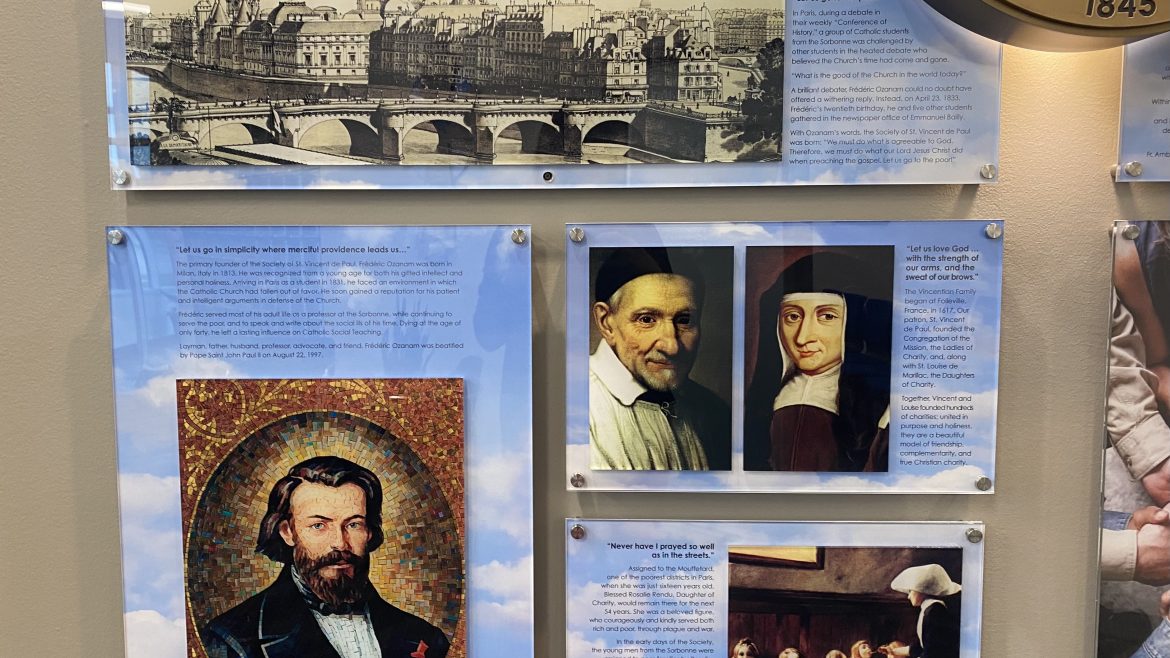 Two weeks ago, Society of St. Vincent de Paul leadership from across the country gathered again for the first time in more than a year. Their primary purpose was Board and Strategic Planning meetings, though they had another reason to gather as well: to witness the dedication of the National Council’s new headquarters at 66 Progress Parkway in Maryland Heights, Missouri.
Two weeks ago, Society of St. Vincent de Paul leadership from across the country gathered again for the first time in more than a year. Their primary purpose was Board and Strategic Planning meetings, though they had another reason to gather as well: to witness the dedication of the National Council’s new headquarters at 66 Progress Parkway in Maryland Heights, Missouri.
While the building serves as day-to-day office space for the National Council staff, it also houses some special spaces for Vincentians who may visit the headquarters.
History Wall
Created in conjunction with Toucan Design and Engraphix Architectural Signage, the National Council’s History Wall is a focal point of the building’s lobby. Sheri Brimer and Melinda Borman of Toucan Design noted their collaboration with a group of National Council staff, headed by Chief Operations Officer Nancy Pino.
Said Brimer, “As you can see by the many photos of [neighbors in need], staff, and volunteers, there is a unified mission that revolves around the five main founding tenets: Humility, Zeal, Selflessness, Gentleness, and Simplicity. And we hope that each visitor comes away with a better visual understanding of the Society of St. Vincent de Paul and all that it encompasses.”
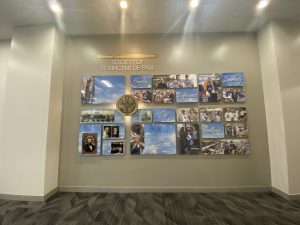
Pino notes that the installation is more than just a History Wall depicting the Society’s past. Featuring images of not just our founders, but of Vincentians from across the United States serving their neighbors in need, it helps “express the story of our beginnings, who we are — and who we aspire to become.”
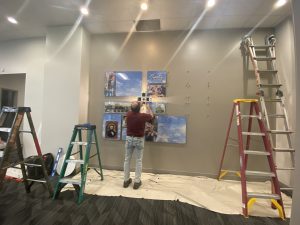
The team from Toucan was able to weave together the Society’s past and present, as well as our Essential Elements of spirituality, friendship, and service into one cohesive design.
“The large gold medallion that sits near its center becomes a sort of heart for the piece with light emanating on four sides, which in turn, illuminates the subtle cross shape created by the background spaces. There is a specific flow of St. Vincent’s story from the bottom left quadrant upward and outward to the top right section. The idea of the entire organization branching out and spreading across both time and continents is highlighted here.”
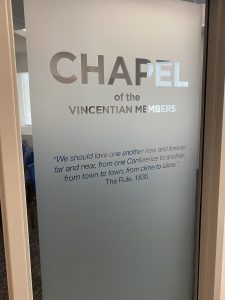 The Chapel of Vincentian Members
The Chapel of Vincentian Members
Directly across from this history wall sits the Chapel of Vincentian Members. National Council CEO Dave Barringer had this to say: “We want to lead with our faith, so a chapel space was forefront in our design plans.”
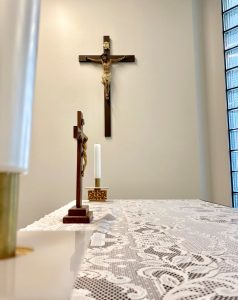 The balance of past and present flows from the History Wall into the Chapel as well. While the altar is a new piece, the Stations of the Cross, crucifix, and seating came from the Archdiocese of St. Louis’ Reclamation Center. Quipped Tim Williams, Director of Formation, “It seems very appropriate that we got so much of the décor from the church’s ‘secondhand store!'”
The balance of past and present flows from the History Wall into the Chapel as well. While the altar is a new piece, the Stations of the Cross, crucifix, and seating came from the Archdiocese of St. Louis’ Reclamation Center. Quipped Tim Williams, Director of Formation, “It seems very appropriate that we got so much of the décor from the church’s ‘secondhand store!'”
The stations have an artistic, handmade feeling, especially since the IVX station sign was missing, requiring the team had to create one that would match the existing set.
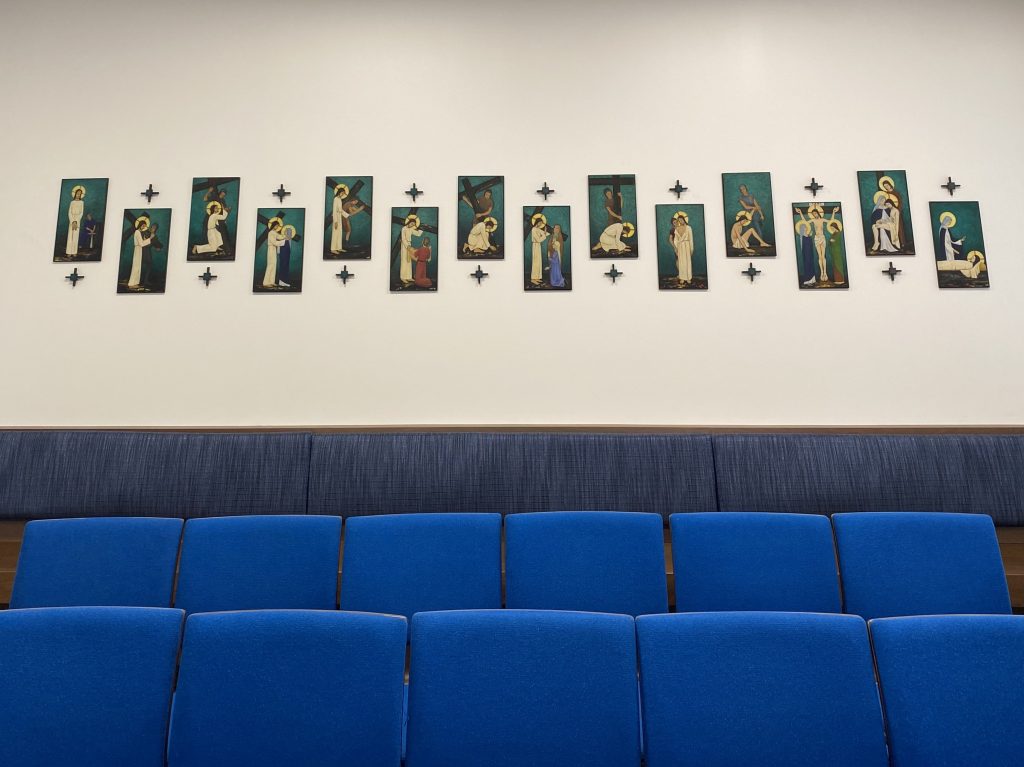 The space is filled with natural light coming from glass bricks off the building’s V-shaped entryway (which predates our occupancy), and the new altar has a V-shaped base whose shape mimics old glass wall. The overall feeling is one of serenity and harmony.
The space is filled with natural light coming from glass bricks off the building’s V-shaped entryway (which predates our occupancy), and the new altar has a V-shaped base whose shape mimics old glass wall. The overall feeling is one of serenity and harmony.
“Overall we wanted the chapel to have a humble, reflective feel that matches our Vincentian Vocation,” said Pino.
“I love walking in through the front door of the new National Council offices,” says Tim Williams. “As soon as you step inside, you get tangible reminders of our three Essential Elements.”
He added that the chapel “is the spiritual center of this place, and is dedicated to our Vincentian friendship. Right across from the chapel is a wall decorated with images and words from our founders, saints, and blesseds, interspersed with images of our members from all across the country serving people in need tirelessly, creatively, and cheerfully. As a Vincentian, it makes me just immediately feel like part of the great heritage of this Society.”
Adds Pino, “I truly hope that all the Vincentians that visit our National Office enjoy the space and feel both inspired and appreciated.”

